#these are obviously all very shorthand
Text
it's also a bit of a stretch to imply that tommy relates grace's singing to the abused woman whose birds singing to her being the only pretty things in her life, because otherwise she has to suffer her abusive marriage without reprieve.
you can say a lot about tommy and lizzie's relationship, but he's not being (physically) abused in it lol - and contrary to her, tommy has other niceties and pretty things in his life as well (he's also not entirely powerless, despite everything)
another part of this is that tommy and arthur briefly seem to believe the woman's husband murdered her children, and she's bringing proof in form of their dead bodies (or parts of them?).
now one thing that keeps tommy alive, and what's holding off his suicidal ideation, are literally his own children (one of them being grace's son!). he loves them dearly and sees them as one of the major reasons to not kill himself - he brings that up when he has the conversation with ghost!grace where she goads him to end it all
#abuse /#i'm all for sad victimized tommy hdhd but that's not something you can argue for#suicide /#obviously grace singing to him was very touching and used as a sweet romantic shorthand to see him soften for her but ... that's a stretch#not when there's something that reminds him of grace very concretely that gives him a very literal reason to stay alive (that being charlie
9 notes
·
View notes
Text
b*t*s recognition for older, western, beginners (me): (pls ignore if you are experienced army this is for funsies only) (or add more, or corrections, or whatever, i can't tell you what to do lol)
kim namjoon (rm) hyung-line: tall, rapper, perfect english, brainy smart, leader: so often mc-ing and/or wrangling bag of catsmembers, longsuffering, sarcastic and funny, big boy, accidental breaker-of-things
kim seokjin (jin) hyung-line: also tall, singer, princely handsome, fashion plate, actor, oldest but only pulls the card occasionally, from money, suave but also dork, well-traveled since childhood *enlisted in december 2022
min yoongi (suga, agustd) hyung-line: short, rapper, has the producer/songwriter/rapping archetype going for him, mostly in black off-duty, pretty cat man, introvert, deep speaking voice, lil bit of a godfather vibe but tiny cute godfather?, stealth fond and affectionate (yes my bias shhh)
jung hoseok (hobi, j-hope) hyung-line: medium height tier, dancer & rapper, distinctive high cheekbones and sunshine smile, laughs a lot but has that dance practice stern face when he's not joking, often indulgent wine aunt vibes, actual pre-debut street cred like rm and suga *just recently went for enlistment
kim taehyung (v) maknae line: shorter but not short, singer: has a husky breathy register out of several modes, it boy and model, princess mode needs care and attention, poor boy made good, emotional (actually they all cry a lot if you go by videos)
jeon junkook (jk, kookie) maknae line: medium tall, main singer: often a clear r&b flavored tenor, "the one with the tattoos" (right hand and full sleeve most visible) and the calvin klein ad, lip-piercing as well now i believe, strong, extremely hip, excitable, good at everything, the youngest and Baby
park jimin (jimin) maknae line: technically shortest, singer: clear high tenor, trained dancer like *whoa*, flirt, smooth and stylish, pretty as a personality trait, maknae gremlin but with hyung maturity (caretaker), abs, falls off chairs (and only chairs? otherwise immune to gravity)
- these are some busy, busy elite-caliber performers at the very top of the game and i definitely am in awe. like the guys who technically aren't "dancers" in the group are still leagues above many regular official 'lead dancers' in skill - as a whole they are just functioning on another level and it is impressive. i understand army a lot more now
#b*t*s#no actual army need this#this is just VERY brief overview of casual watcher who is old and white and american#obviously many many facets have been skipped over because of shorthand generalizations#literally just going from vibes#also to editorialize: i have never seen such a bunch of human cats to all have puppies as pets lol#the only one who actually gives me puppy energy is jin the rest of them ...#you ever see that video of the cats where they have all perches on the wall and the cats all run to their places at a signal?#yeah. that and then the one where one cat misses a jump and knocks over a screen and the entire roomful of cats#collectively has a startle reaction/zoomie fit and results in utter disaster and s couple of hissy near-fights? also yeah.#as with most kpop there's too much rap and the singing pitch is often too consistently high for my absolute comfort#but boy do i have my faves which are currently (i do realize in opposition to what i just said)#jimin's solo set me free and run - in part bc of my weakness for dance practices#highly highly recommended#trying not to have this in the tag but with the names ... *sigh*
3 notes
·
View notes
Text
dolls by design cannot move without someone external to them moving their limbs, so even if a living doll character can move on their own, they still implicitly have this relationship to others where they not only cannot resist being touched (and by extension controlled), they cannot do anything at all otherwise. dynamics of power and control are often eroticised, and doll joints immediately mark a character as slotting into this kind of dynamic, similar to how maid outfits are sexy to some people because of the dynamic of servitude they signify. this is the main point that the vast majority of self proclaimed doll enjoyers seem to latch onto, doll joints as visual shorthand for a dynamic of dependency that may or may not be sexual.
dolls exist to entertain someone and be loved by them, their sole purpose is quite literally to look pretty for their owner. this too is a popular erotic dynamic even when no dolls are involved. dolls are artificial creations, so a doll inherently exists the way it does because someone wanted it to. in some cases this is extended into its reverse: a doll does not exist without someone wanting it to, therefore, the doll is wanted because it exists. the very fact that the doll exists implies a fascination with either the doll itself or the one it's made to look like, because without this fascination it wouldn't exist to begin with. the doll exists to be loved, so you desire it by virtue of its existence, and this gives it a certain power over you despite its powerless nature. the most common cursed doll in media is one that is resentful over being abandoned. the desire for another is inherent to dolls and this is, obviously, erotic.
in my experience this is usually the angle when you're dealing with a sorcerer that made themselves a doll body or something like that. the tension between the doll and the force that moves it is resolved by having these be the same entity, so they're a doll to signify fascination instead, be it from or towards the one inhabiting the doll.
dolls are often associated with being fragile and delicate, especially the ball jointed type that living doll characters will usually invoke. they have to be touched in order to act, but cannot be touched without risk of breaking this precious delicate object. this tension of a body that both invites and discourages being touched is also erotic.
a doll's body is implicitly delicate, but it is also a body that can be repaired or replaced when it breaks. you can completely dismantle a doll without actually harming it, and in fact dismantling it is necessary to fix it in case it does break. a sentient doll's body would logically have to experience itself differently than a human flesh body. since you can open up and pull apart a doll in various ways without actually hurting it, there are naturally various ways to touch it erotically that you could never do with a living person, and because the doll by definition exists for you, this touch can be as painful or pleasurable for the doll as your proclivities dictate. for some reason fucking nobody on pixiv seems to agree with me on this point but this is a big one for me personally, the unique ways of interacting with doll bodies as extension and expression of the way a doll's body inherently has a complex and contradictory relationship with being touched. we're talking about a body made of gaps, go stick something in those for fucks sake.
a doll allowing itself to be taken apart to be repaired (or to have freak sex) is an incredible display of trust similar to that of robots letting you poke around their circuitry. it's an emotional intimacy that's only possible with this kind of artificial partner. the capacity for and necessity of occasionally being completely taken apart and reassembled to continue functioning, of exposing yourself entirely and putting your trust in someone's deft hands, is obviously erotic.
a doll cannot exist independently, and while its purpose is to be loved, it's rare for it to be thought of as an independent actor by anyone other than children. also, if the doll /isn't/ loved it becomes completely helpless, because it needs someone else to move it, be it literally or metaphorically. a living doll character will, sooner or later and thematically if not directly, have to contend with the fact that this is a horrifically stunted existence for a sentient being to have. a doll cannot meaningfully resist anything that is done to it, and its only blessing is that it has a body that can endure this. you can violate dolls both physically and emotionally in ways far more invasive than with a real person, and depending on your angle their very existence as a doll is a violation in itself, something that lends itself well to the overlap between horror and eroticism. this is another favourite of mine that I barely see reflected in what other people are cooking up in my field of vision.
even if a particular doll character doesn't tick any of these boxes regarding characterisation or relationships, the fact that they have doll joints anyway is a constant reminder of these associations, and this contrast is alluring in itself. independence does not come naturally to a doll, so a doll that acts freely is fighting a constant battle against its own nature. this is hot and extremely underutilized.
being denied agency because the material reality of your body makes you dependent on the goodwill of others is an experience many real people can relate to for a wide range of reasons, so living dolls are useful abstractions to explore these experiences and reframe these limitations as something that makes you desirable. unfortunately this leads to most of the dollposting on this site being really boring to me because its all like "what if i was cute and loved and didn't have to think for myself" instead of the horrific violation and unique physical experience parts that i'm personally interested in, but it's undeniably a major contributing factor to general doll enjoyment.
the presence of doll joints on a character invokes a relationship to the body and the people around them that lends itself well to various popular erotic dynamics, and which marks them as object of desire not entirely unlike how a womb tattoo marks someone as primed for fucking except for people who can't get off without metaphors. im sure for a lot of people it's really not any deeper than "it looks nice :)" and that's fair, I'm a pretentious elitist who thinks most people producing doll fetish stuff are boring about it though. stop drawing regular sex with more lines and stick your fingers in there NOW
440 notes
·
View notes
Text
My brain is on fire same I can’t sleep and am thinking of this:
The way she writes about marriage/family/commitment through these different situations across the album is soooooooooo interesting.
You have a very intense first experience of it in “The Manuscript,” where it is first dangled in front of her/the narrator’s young, impressionable self as shorthand for real love in a situation that ended up being smoke and mirrors. She’s being told everything she wants to hear by someone who basically thinks it’s just foreplay. In the end, when it’s clear that the other person has no intention of actually making a life with her, it makes her feel used, but she forces herself to recalibrate and become the girl she thinks he and all the other hes want her to be. Easy breezy cool. But there’s a sense of loss in realizing those hopes were merely banter to the other.
You have the “grown up” version of it alluded to in “So Long, London” and “How Did It End?”, the years of putting in work to save a relationship and the “deflation of our dreaming leaving [her] bereft and reeling” leading to them “calling it all off.” The implication is clearly that they built a home together with plans for next steps at a point in time, but the commitment is shattered. (Obviously to me it sounds like marriage.) She’s bitter at spending her “prime” years with someone who ultimately didn’t want to be there, even if he couldn’t or wouldn’t admit it himself.
She felt like she did everything she was supposed to, but they were learning the right steps to different dances at as it were. Those dreams were at one point shared, but in the end they weren’t right for each other and she admits that, though bitterly (“I founded the club she’s heard great things about” eg the years she put in for him to help him grow up will end up benefiting his new lover, “but I’m not the one,” “you’ll find someone,” etc.). Mixed in with all this of her resentment of him wasting her youth (sacrificing herself at the altar), and his resentment of her for reasons less defined, and insinuations of betrayal in the shadows. The fantasy of the whole package disappears into the ether, yet she still has no answers as to how they got there.
Then in comes the wolf in sheep’s clothing in many of the rest of the songs, the one who promises her all those things she’s dreamed of since she was a kid instantly. After years of moulding herself to other men’s desires, someone comes in and tells her exactly what she wants to hear at the most vulnerable time of her life, as though the universe is answering her prayers, like some sort of cosmic payback for all she’s suffered, and it’s the most intoxicating drug of all. She’s gone from her wish for a family life feeling like she’s in a way being used for her body, to it being used as a chain to a relationship gone sour, to having someone put a metaphorical ring on her finger and tell her he wants to have babies with her, fuck those other guys.
In her grief and stupor, it’s too good to be true, which is exactly why she falls for it. But of course, it’s all an illusion, because this wolf is an amalgamation of the worst of all the men who came before him. He tells her everything she wants to hear not to make her dreams come true, but to make his. He takes the worst parts of these scenarios to make his move: he’ll stand by her, he’ll commit, he’ll do it out in the open under the spotlight’s glare (all things desperately lacking in her last relationship), but after he beds her he stabs her in the back in private and leaves her. He got what he wanted at the expense of her losing everything she wanted, this time as her world caved in seemingly for good. She feels like she gave up everything she thought she might have had for a chance that this is where the universe has been point her all along, only to be left broken for good (you represent the loss of my life as I knew it).
Then there are two sort of codas to this. In “But Daddy I Love Him” we get a sassier reimagining of “Love Story,” where the girl with the scarlet letter is mouthy and crass and tells everyone to go fuck themselves for cursing her in the first place, choosing her love above all else. And no, those haters can’t come to her wedding. Her daddy may have come around, but they sure can’t. Finally it seems someone is choosing her and will someday give her these things, and she’ll be able to show all the naysayers. (Also interestingly one of the more fictionally-veiled songs which ends happily vs the diaristic ones that don’t.)
Then of course there’s “So High School,” our first glimpse into what the future holds. Probably the only unabashedly happy (nay… electric?) song on the album, it’s all about reclaiming the buzz of youth (which is a whole other post) with a new lover. “Are you gonna marry, kiss or kill me? It’s just a game but really, I’m betting on all three for us two.” It’s, er, a direct nod to a certain now-infamous interview, but again, she’s staking her claim on her future, if not certain then at least hopeful again. This time the prospect doesn’t come with a “but.” It’s not, we’ll be pushing strollers but actually you’re too young. It’s not, we had these dreams for our future but actually I can’t move forward. It’s not, I’m going to promise you a ring and a baby but only until my needs are met and then I’m out. It’s, I know what I wanted and I’m not leaving, and thanks to that now she stays too.
The album dealt with the theme not at all in the way I expected, but is absolutely fascinating.
#writing letters addressed to the fire#me thinking too hard about Taylor lyrics#the tortured poets department#i have many thoughts#No brain power
728 notes
·
View notes
Text
the shorthand developed between longtime couples or friends can be embarrassing, yes, but it can also be confusing for others in the best of ways.
exposition: my partner is rather squeamish, especially when it comes to various bodily things - and if you've known me for a while, you know that I love all things body and body related. we share one desk, with all our monitors aligned, and we often peek at what the other one is doing - same with phones, especially when we're having some downtime in bed. now, to relax, I really like watching various body-related videos - for example anatomy lessons with cadavers, or dental videos, especially tooth extractions - but that's something that would obviously absolutely upset my beloved. so the first time I was watching something like that and they peeked, I had to quickly cover my phone, and then explain that I was watching a dentist extracting a tooth.
now, this has to be a quick reaction - and I know that too many details about what it is exactly that I'm watching can be upsetting or disgusting on their own - so I've resorted to just saying DENTIST. when my love looks over and has the chance to potentially see something yuck. just dentist. it works!
fast forward to us picking up a friend from a music festival over summer - not a big concert but more a set of smaller scenes with a very specific vibe. definitely a vibe that encourages people to partake in various substances. while waiting for said friend, my partner told me they needed to pee, and so we went to the long line of porta-potties - and they've asked me to go in first to check the state of the facilities for them. and as I got in I saw that, well, it was bad. big bad. as bad as you can imagine a porta-potty to be.
and so to be quick, as my partner was about to enter after me and see all the bad everywhere, I just yelled DENTIST! DENTIST!
let me tell you. the line of people high out of their mind waiting to pee. hearing me yell DENTIST repeatedly from the belly of the portable toilet, to the clear horror of my partner. the look on their faces. the silence that fell. I can only wish I did not ruin anyone's trip with my sudden invocation of the dental nightmare but I'm not too hopeful on that you know
786 notes
·
View notes
Text
Blitz is dyslexic (petty post about why I'm right with proof from recent episodes)
Disclaimer: I don't have dyslexia, so I can't speak from personal experience, BUT neurodivergent people tend to find each other, and I've been very close with a few people with dyslexia, to the point where I've extensively edited their writing. I've also learned quite a bit about dyslexia while working in the education field. Okay- let's go.
I hear way too often (yes, I'm referencing a certain youtuber here) that Blitz can't have dyslexia because we sometimes see him reading and we sometimes see him writing without errors. So when he shows spelling and grammatical errors in his texts and notes to self, that must just be him being rude/trying to be cute/being lazy.
And if the errors were just slang and abbreviations, maybe the people making those arguments would have a point. But they're not. And I'm convinced that he has dyslexia. So what gives? Why the inconsistency (assuming it's an intentional choice on the part of the writers)?
Most dyslexic adults CAN write correctly with extra effort. It's just harder. In the learning disability world, we sometimes call it self- accommodating. With any disability, that means doing work that neurotypical people don't have to do in order to overcome the obstacle that the disability poses- and often, no one else sees that work or understands that it's necessary. For people with dyslexia, that often means that they have to check and double check their writing.
When YOU AND I (if we're both non-dyslexic people) write casually and don't put in effort, our spelling is going to be mostly correct. And if we use slang and abbreviations, it's a choice. When someone with dyslexia shoots off a quick text, it's going to look messy, and they'll probably only do it in a text to someone they're comfortable with. THAT IS THE DIFFERENCE.
Let's look at some recent examples from Helluva Boss.
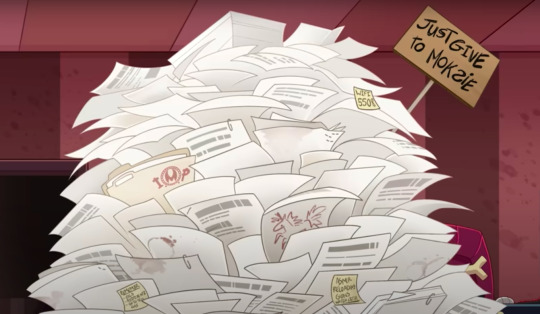
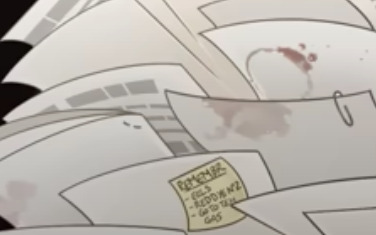
Blitz is writing notes to himself here, so he doesn't have any need to make them presentable. Cute inside jokes with himself are possible (i.e. the horses and nicknames that we sometimes see), but the spelling mistakes here don't really make sense as jokes. They also wouldn't be easier to write than the correct words for someone who isn't dyslexic. Mok(backward S)ie isn't shorter than Moxxie, and remembr isn't much shorter than remember. The spelling is also phonetic, which fits with how many people with dyslexia spell in initial drafts. He just isn't watching for and correcting his mistakes, because why would he in this situation?!
Okay, different situation . . . the apologies. I would argue that Blitz IS putting in physical effort here, even if it's not emotional effort. He brings entire gift baskets full of his favorite foods for the people on his apology list after all. Here's what he writes to the DHORKS:
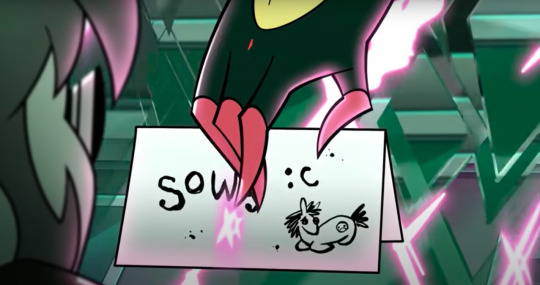
I think "sowy" IS meant to be cute here. It's not phonetic after all. He put a little effort into drawing them a cute little horse too. And then the cherubs . . .

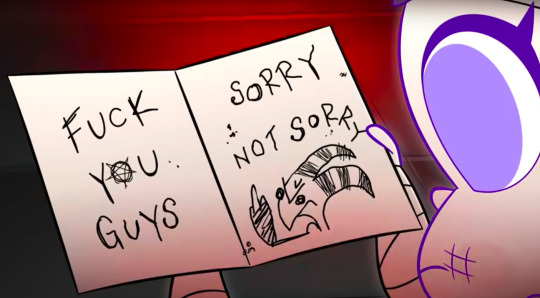
I think this is pretty interesting. Blitz actually bothers here to fix his spelling mistake. He spells everything right on the inside too, even though he's telling these guys "fuck you." Notice that he runs out of room and has to write sideways. And notice the nice block letters on the front. In terms of why he's trying so much here, well, it's to prove to Stolas that he can put effort into apologizing to people, isn't it? And that means that the unintentional errors get fixed!
Now, Blitz tries to text an apology to Stolas (and obviously stalls for emotional reasons), and we see him typing it in real time,
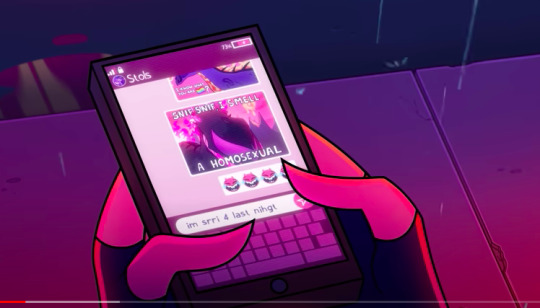
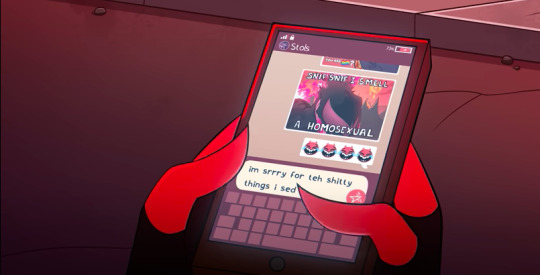
Yeah . . . it's a combination of shorthand and just plain old misspellings. He's focused on choosing the right words, not on getting the spelling right, and it's impossible to say he doesn't care at this point. Someone who has an easy time writing correctly spelled text might use some shorthand, but just like we saw with Blitz's notes to self, they wouldn't likely intentionally misspell completely unnecessary things, especially when trying to come off as genuine.
Sigh. I rest my fucking case.
If you'd like to see my thoughts on that text conversation from Western Energy, go ahead and click on the link- it isn't really about dyslexia, and I do actually think that Blitz is pretty literate in spite of his disability and limited education, but it does explain why I think the conversation goes the way it does.
#My helluva meta#stolitz#blitz#blitzo buckzo#blitzo#helluva blitz#helluva neurodiversity#should be obvious but this doesn't negate other neurodivergences that he clearly has#People rarely have just one condition
187 notes
·
View notes
Text
So…you want to know more about Korean shipping terminology (and how does this apply to Ateez?)
Luckily, I have spent the better part of six years of my life learning Korean! Which fortunately(?) means that I have learned plenty about the lingo Korean BL fans use re: shipping dynamics. Actually, this makes it SO MUCH easier to navigate websites like Twitter, where NSFW posting is censored for security reasonable. The difference is that English speakers do not have an organized method of referring to the members in their ships (for example, one user might write seongjoong as secngjccng where one might instead write sxxngjxxng, and where another one might even write sngjng, etc etc). But how do Korean speakers handle this situation? What is the context behind all of this? I will provide with you with a fun and easy chart at the end, but first….Let me explain:
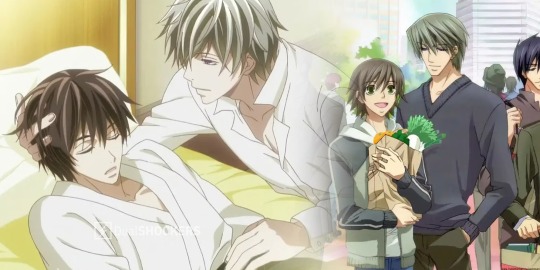
Taking you back to the early 2000s
Our setting: the early Korean BL online forums. The terminology originating from these spaces were unsurprisingly heavily influenced by the original sources from which BL manga was derived: the Japanese language. Japanese has a system of Chinese characters used to simplify the writing process known as Kanji. Korean has a similar concept, known as Hanja. Where as Kanji is still heavily utilized to this day for a variety of reasons (my Japanese teacher would always say its main purpose is to minimize the amount of script needed to convey an idea), Hanja has largely fallen out of fashion—used primarily to clarify homophones in text, in literature such as novels and older writings, and as a stylistic choice to depict words such as Death and God, etc.
First, I’m going to give you some terms that are familiar to quite possibly all of you.
Seme (攻め) - the dominant figure in the relationship. Most often, this person will also be depicted as the top.
Uke (受け) - the submissive figure in the relationship. Most often, this person will also be depicted as the bottom.
Are you following so far? Great! In the most stereotypical depiction of homosexual relationships in Manhwa, these roles—the dom top and the sub bottom—reigned supreme so much so that eventually the community fell into the pitfall of believing these four terms to be interchangeable. While simplifying the process of understanding each person’s role in sexual intimacy, it also didn’t lend much of an allowance to explore ideas that defined this view of sexuality. This lack of nuance and flexibility has very little to do with why I’m writing today, but I do want to give some more context as to why these terms became such reliable shorthand.
Anyway…
In Korean BL spaces, these Kanji symbols (攻/受) were directly translated into 공 and 수, respectively. 공 literally means “Ball” but in the context of the Hanja, it means “attack” or “strong”, basically dominant top. 수—“Number”—“to submit” or “to receive”—submissive bottom. Don’t worry, this is the absolute last time I will be explaining these ideas.
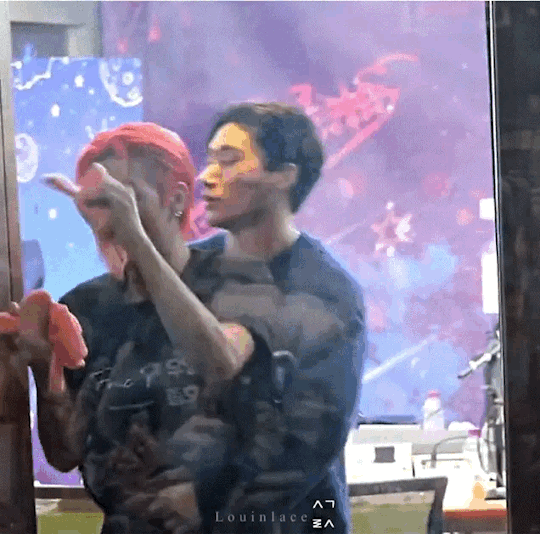
How does this work in Korean BL spaces?
Now this may also be familiar to many of you: the placement of each figure in the ship name MATTERS! In SFW spaces, you can get away with referring to Yunho and Mingi as Yungi because….well….platonic friendships aren’t normally referred to by dominance dynamics. In NSFW spaces, specifically dealing with fictional depictions of gay sex, referring to Yunho and Mingi as YunGi will have most people assuming that you mean fanfictions in which Yunho is the top and Mingi is the bottom. Oh, you didn’t? Well, obviously you meant to say MinYun (or MingYun or MingHo, I’ve seen this written all kinds of ways tbh). See what I mean? Now this isn’t always the case—familiarity is everything, so it’s not uncommon to see Wooyoung and San referenced as WooSan, no matter who is intended to be the top.
In Korean, ship names are almost always written in order of placement. For example, 윤낫 (we will get into why the Hangul in San’s name is reversed later) would refer to a Yunho x San pairing where Yunho is the top and San is the bottom. Likewise, 낫윤 would imply the exact opposite. Anyone want to take a stab at what 밍웡 means? How about 섷쫑?

2010-2024, A minor shift in focus
As the spaces for these conversations grow and change with time, as did the terminology used to describe shipping dynamics and pairings.
If you are a fourth and fifth gen K-pop stan, you know what a coupling, or chemi, name is. Korean fans who did either did not want to discuss their idols in a romantic/sexual manner, or otherwise wanted some way to differentiate a typical shipping name from a platonic pairing name, developed the concept of using a chemi name instead. For Ateez, these would be:
E-Kang-Mo (에강모) / Yunho and Yeosang - the shortened version of 에이티즈 강아지 모임, literally translating into the Gathering of Ateez Puppies.
Matz (맏즈) / Seonghwa and Hongjoong - TWO MEN WE’RE ON FIRE 위험해‼️‼️‼️ Shortened version of 맏형 which literally translates into Oldest brothers. This quite obviously refers to our two oldest members within the group.
Elsewhere, you may come across 삼복즈, Jiwoong and Yujin from ZEROBASEONE. Or 채채즈, Chaewon and Eunchae from LE SSERAFIM. Usually this name is derived from some personality aspect or moment the two idols share, and can be given organically by fans or by the idols themselves. They are used strictly by both Korean and international fans as a means of referring to these idols and their friendships. It’s still possible that you find a fan who skips the whole “having to learn a completely different unit name” thing and just uses the traditional pairing name (I know, because I’m one of them), and in this case you can likely tell exactly when they first got into K-pop.
During this decade, shippers developed two more terms to further break down sexual dynamics, this time focusing on top/bottom. 왼 is the Korean directional word for “left”, and in the context of BL, means top. For bottom, Koreans use a shortened version of the directional word for “right”—른. I am not entirely sure whether the general consensus seems to be that these terms are still strictly tied to the idea of a dominant top and a submissive bottom, as most of the resources I used to search for these terms waffled on the subject.
In practice, 웡왼 will refer to shippings in which Wooyoung is a top (I searched for this on Twitter and came up unsurprisingly short….) and 쫑른 is in reference to shippings where Jongho is a bottom!

Enough Already!! Just give us the tags!!
Loud and clear, boss. However, I just need a bit more contextual information out there before I finally get into the list:
Variations - there are few variations that exist within the Korean shipping fandom, save for instances in which another pairing could possibly exist within a different group.
Censorship - Korean fans are also heavy on making sure these posts do not make it into the hands of Ateez themselves (see: the chaos that happened when San stumbled across self-insert fiction written by K-Atiny). Member names are not written properly, and will always be altered in some way as a means of masking it from normal search results. Please pay attention to this!
Pronunciation - some letters are altered in the pairing names as a means to aid with pronunciation. This is sort of an intuitive thing with Korean, so I’m not sure how to explain this in a better way.
And now…the list!
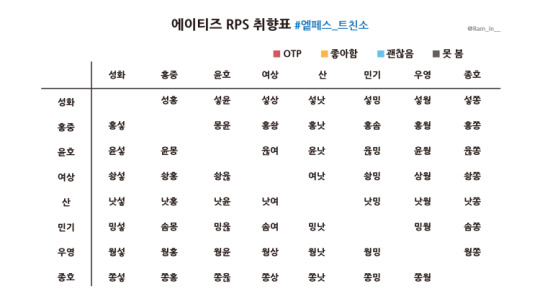
Here’s how to follow the chart:
Reading from the top down, you will find the 른—or pairings where the member is the bottom. For example, Seonghwa’s column reads:
홍섷 - Hongjoong x Seonghwa
윤섷 - Yunho x Seonghwa
솽섷 - Yeosang x Seonghwa
낫섷 - San x Seonghwa
밍섷 - Mingi x Seonghwa
웡섷 - Wooyoung x Seonghwa
쫑섷 - Jongho x Seonghwa
Likewise, reading the chart horizontally will provide you with the 왼—or pairings where the member is the top. For example, Mingi’s row reads:
밍섷 - Mingi x Seonghwa
솜몽 - Mingi x Hongjoong
밍윦 - Mingi x Yunho
솜여 - Mingi x Yeosang
밍낫 - Mingi x San
밍웡 - Mingi x Wooyoung
솜쫑 - Mingi x Jongho
Additionally, adding (Member name)른/왼 will provide you more general posts where Korean fans are discussing the idol as a top or a bottom in general without referring to a specific ship.
Hongjoong: 홍왼 + 홍른
Seonghwa: 섷왼 + 섷른
Yunho: 윦왼/윤왼 + 윦른/윤른
Yeosang: 솽왼 + 솽른
San: 낫왼 + 낫른
Mingi: 밍왼 + 밍른
Wooyoung: 웡왼 + 웡른
Jongho: 쫑왼 + 쫑른
Thank you for reading! I hope this was as useful for you as it was for me! Of course, I knew a lot of history regarding this topic due to the ample time I spent reading BL, but I will admit that I did not have much time to research this topic specifically. However, if you have any corrections to make, let me know!! This was so much fun for write, and maybe I can do something similar to this in the future as well.
Bye!
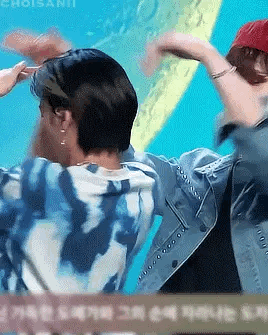
#ateez#halia speaks#ateez rps#hongjoong#seonghwa#yunho#yeosang#san#mingi#wooyoung#jongho#ateez fluff#ateez smut#ateez angst#woosan#seongjoong#jongsang#yunwoo#yunsang#yunsan
96 notes
·
View notes
Note
hi!! i hope you’re having a lovely day :-) i really enjoy reading your blog and how you pick apart Things & was wondering if you have any tips and guides for reading and analyzing poetry? ive always struggled w forming coherent thoughts abt poems and would love to know how you approach it. thank you sm for your time ✨
so the big thing that made poetry "click" for me was realising that i was trying to read it the way i might try to read a novel -- identify a discourse taking place, look for points in the text that supplement my argument, construct a position on what the piece is "about" based on these points -- all very undergrad essay-core and frankly a v boring way to think about novels as well, but like, completely mind-numbing when it came to poetry. i think a better approach is to interface with the poem at the level of language and technical construction. i find that it helps a lot to know the technical terms for particular phenomena in the language of poetry, but even without that shorthand knowledge, you'll get a lot out of poetry when you start looking at the choices being made at the level of individual words or even syllables. so instead of asking "what is this poem about?", we can start to ask, for instance:
what is the tone of this poem? is it sparing or loquacious? emotional or detached? asking questions or answering them? what's the vantage point - is this a detached omniscient third-person narrator making observations, or are we as the reader being guided towards a particular perspective on the part of the speaker?
what is the mouthfeel of this poem? can you find any 'shapes' -- any assonance, any internal rhyming, alliteration, anything that causes you to pay attention to particular words, phrasing, etc. why is your attention being called to those moments?
what is the rhythm of the poem? is it free verse -- if so, can you find any points in the piece where more or less attention to rhythm is being paid? why does the line break on this particular word? are the sentences short or long? how is the poet interfacing with their chosen meter? what does this meter lend to the poem? if you're reading multiple works by the same author, compare their use of meter -- do they use the same meter regularly or switch it up, and why were those switches made?
if you can annotate a poem, do so. note down anything which seems linguistically interesting, even if you don't know the "correct" technical word for it -- any clusters of words with similarities whose placement might be interesting (eg. what words are rhymed!), any noteworthy rhythmic discrepancies, placement of line breaks, anything that sticks out. i like to think of reading poetry as a playful exercise -- you're playing around with the words, seeing how they work, enjoying the rhythm and texture of the piece as it comes to you, and trying to construct "a reading" only after the fact.
i think there are times when the reading-for-a-discourse approach can be v helpful and illuminating, but it's best to stumble on those opportunities organically rather than focusing all your energy on trying to answer the "what is this trying to say?" question. if a particular discursive component of a poem sparks your interest (like eg. you read the rime of the ancient mariner and notice how the poem interfaces with contemporaneous abolitionist discourses as well as colonialist ideas about polynesia, just as an example), you've obviously got a compelling hook from which you can anchor a reading, but going in expecting such a reading to jump off the page will often just result in frustration.
this doesn't mean that we don't take the discourse of a poem seriously, or that we don't understand the "rules" of poetry to be postdiscursive phenomena highly contingent on social context. if anything, understanding poetry at a mechanical level opens up significant doors for answering these types of questions -- we can understand, for example, the reactionary nature of the academic revolt against free verse and the desire to return to metered poetry better once we understand the function of form and structure in fascist aesthetics. similarly, spending this kind of time with a poem makes it a lot easier to get a handle on what it might be "about," and what sort of choices are being made to render that "about"ness coherent.
also -- and this is true of anything, including poetry -- if a poet isn't working for you, try reading somebody else. a lot of poets that people will say are good and interesting are neither of those things. poetry has the advantage of being (usually!) a quick read compared to novels, so it's far easier to shop around, read widely, realise what you like and dislike, and engage accordingly.
one of my favourite pieces of literary criticism and examples of the value of this sort of reading practice comes from nabokov's epilogue to lolita, in which he both defends the novel in question against accusations of salacity and speaks very disparagingly of efforts to read a thesis statement into it. he writes:
Every serious writer, I dare say, is aware of this or that published book of his as of a constant comforting presence. Its pilot light is steadily burning somewhere in the basement and a mere touch applied to one’s private thermostat instantly results in a quiet little explosion of familiar warmth. This presence, this glow of the book in an ever accessible remoteness is a most companionable feeling, and the better the book has conformed to its prefigured contour and color the ampler and smoother it glows. But even so, there are certain points, byroads, favorite hollows that one evokes more eagerly and enjoys moretenderly than the rest of one’s book. I have not reread Lolita since I went through the proofs in the spring of 1955 but I find it to be a delightful presence now that it quietly hangs about the house like a summer day which one knows to be bright behind the haze. And when I thus think of Lolita, I seem always to pick out for special delectation such images as Mr. Taxovich, or that class list of Ramsdale School, or Charlotte saying “waterproof,” or Lolita in slow motion advancing toward Humbert’s gifts, or the pictures decorating the stylized garret of Gaston Godin, or the Kasbeam barber (who cost me a month of work), or Lolita playing tennis, or the hospital at Elphinstone, or pale, pregnant, beloved, irretrievable Dolly Schiller dying in Gray Star (the capital town of the book), or the tinkling sounds of the valley town coming up the mountain trail (on which I caught the first known female of Lycaeides sublivens Nabokov). These are the nerves of the novel. These are the secret points, the subliminal co-ordinates by means of which the book is plotted—although I realize very clearly that these and other scenes will be skimmed over or not noticed, or never even reached, by those who begin reading the book under the impression that it is something on the lines of Memoirs of a Woman of Pleasure or Les Amours de Milord Grosvit. That my novel does contain various allusions to the physiological urges of a pervert is quite true. But after all we are not children, not illiterate juvenile delinquents, not English public school boys who after a night of homosexual romps have to endure the paradox of reading the Ancients in expurgated versions.
It is childish to study a work of fiction in order to gain information about a country or about a social class or about the author. And yet one of my very few intimate friends, after reading Lolita, was sincerely worried that I (I!) should be living “among such depressing people” —when the only discomfort I really experienced was to live in my workshop among discarded limbs and unfinished torsos.
#ask#also i know this approach is unbearable to some people. but truly it is what made poetry work for me. so!
229 notes
·
View notes
Text
some mostly flippant rambles on including elves in the Saltreave (that fantasy setting I write when I'm not working on my more serious projects) along with some setting notes in the margins
well. the setting notes are like 90% of the body of the text.
but we do get to elves. and we stay at elves for a while.
-
THERE IS NO ZERO IN THE ROMAN NUMERAL SYSTEM: Prologue to the Preramble
so I've written about my thoughts on elves as sort of "narrative level lifeforms" before, and that's still very much where my thoughts lie on them, but there are also just kind of elves around as fairly normal people in the Saltreave
this is a bit of a blurry line, because they're obviously not the nature-loving type of elf you see post-Tolkien -- which I'll go ahead and say feels like a deliberately obtuse misread of what Tolkien was implying by them living in harmony with a world that is literally described as the manifestation of a song -- but the bottom line is that Saltreave's elves aren't Tolkien elves, and they're not attempting to be subversions of them, but they are written by someone who quite likes those guys
all of that raises another question: what the hell are elves in the Saltreave?
-
I: Preramble
I put a bit of an information abyss at the beginning of the setting by design, outright saying that the "pre-apocalypse" might as well not exist at all.
to some extent you can say that it must have existed, and there is a bit of scattered writing that implies things about the state of affairs the world was in (mostly in terms of the politics between mortal civilisations and how that manifests in the modern politics of the remaining citystates), but the Advent is where the story starts
the most common explanations of what things were like before the current era are, at the end of the day, just attempts to explain what the people living in it are presently perceiving
the Advent, used as shorthand for a million things that each mean something different to everyone, is either the end of the world or the end of the old order of things. it is both the death of the symbolic plane and its violent merging with the material plane, severing every connection to the symbolic along the way
a bit further down that line of thought, even the present magic system gestures towards being derived from an older practice that was forced to adapt to sudden shift of the central symbolic source to a source diffused unevenly in the material plane, although from what exactly this magic system was forced to adapt remains a bit of a mystery
-
II: Into the Ramble
the Saltwind (the thing that gives the setting its name and effectively wiped out the previous world) is actually harmless
or more accurately, it's a visible symptom of an invisible problem, and that invisible problem is extremely harmful in a way nothing else could possibly hope to be
the "salt" in the wind is actually just salt. it's a lot of salt, but it's still just recognisably some sort of organic salt if you were to hold it in your hands
the salt is both the result of the Advent and a vessel for carrying "warped grain," an invisible ripple of magical static that functions more or less like (non-mutagenic, because I'm actually not a fan of using that as an apocalypse fiction concept) magical radiation
warped grain takes on a bunch of roles, so let's go over a few of those in relative brief
the one most commonly acknowledged fact is that warped grain is a soul-destroying pollution. it's bad stuff. it's poison that seeps into everything. it's in the water, it's in the air, it gets into the food as it grows, and you need to affiliate yourself with a citystate that has access to unpolluted (or otherwise purified) supplies to survive in the world as it exists
a bit less commonly (mostly when scholars and other big-hats talk about it) it's acknowledged as a sort of ambient magical noise that makes spells more unpredictable and dangerous. it can also periodically "complete" a spell if you take too long casting it, making it do something unintended (often killing the caster)
in a pinch, warped grain can be absorbed into the body as some kind of environmental magic energy, allowing someone to replenish their depleted magical energy and forgo resting to generate their own*
*: absorbing environmental energy in a world where it's literally poisoned will also eventually fuck up your soul beyond repair, so it's a really stupid idea and not something any serious magic-user would recommend
but most importantly for why elves are around, warped grain can be seen as the frayed threads of a decapitated cosmological order, death-rattling itself apart
-
III: Rambling About Elves, Mostly
because of their intimate connection to the disrupted symbolic plane of the world, the elves who were alive at the time of the Advent were grievously injured, experiencing the soul equivalent of radiation-induced chromosome aberration, and died a few years later. the generations following this one represent the entirety of the remaining elven population
this means that all modern elves can theoretically be divided into two categories
Selvedge Elves - while ostensibly referring to one of "pureblooded" elven stock, meaning someone whose parentage has never included a mortal. the elephant in the room is that Selvedge Elves aren't real and haven't been for quite some time. an actual Selvedge Elf had a lifespan of about 20-25 years and was not capable of having children, on account of being a wholly symbolic being born into a world where the symbolic plane exploded like an asbestos ceiling. "Selvedge" exists as a highly ideologically-charged concept, and not exactly one that lends itself to any non-reactionary interpretations
Scion Elves - everyone else. all elves currently alive are demimortal, which means that they have at least a bit of mortal parentage. even beyond elves, there are no immortals left in the Saltreave, but their descendants are absolutely still around. the term "Scion" refers to those descendants, but given that there isn't really a group to draw them in contrast to, most people prefer not to use it at all.
now it's worth mentioning, while they're all partially mortal, not all currently existing elves are specifically partially human. the stereotypical elf is human or similar, but there's nothing stopping an elf from being, say, a sylvan (the broad category of mortals who have animal ears and such)
Luuga, a character I've posted a few times, would be considered an elf if her status as a sylvan didn't make people identify that first. that's why she has longer, narrower ears than other feline-type sylvans (contrast the only other example I've drawn, Imiellith, and how her ears are much stouter)
more on sylvans and other types of mortal at some later time, but with everything out of the way, let's get down to some elf facts
-
IV: Indulgently Rambling About Elf Facts at Great Length
elves theoretically have different lifespans from mortal beings, which is something they have in common with other demimortals. elves specifically live about ten years longer on average than mortals, provided they don't die of unnatural causes, which they usually do.
additionally, they have a few notable traits that are more specific to elves
(an egregious number of) examples of these include...
elves only breathe as a learned social behaviour and theoretically don't actually need to do it. the same goes for yawning, coughing, sweating, sneezing, and similar functions. somewhat unfortunately for them, because most living things know they need to breathe, elves are still perfectly capable of knowing they need to breathe, which means they're capable of suffocating. in theory, an elf raised by people deliberately trying not to teach them about breathing wouldn't have to breathe, but that's not really a good way to raise a child
elves tire more based on time rather than effort. this is a subtle distinction, but means that an elf can exert more effort in a burst than a mortal companion, yet drops from exhaustion as soon as they've reached the limit of how long they can work. most people never notice this, since "the limits of exerted effort" and "the limits of time spent exerting effort" overlap heavily
elves are about five times more likely to die of old age on their birthday than any other day, but only if they're aware of their birthday. this is something most people are aware of, and different cultures grapple with this in different ways
in cultures with different calendars, the previous point also holds true. in cultures without the concept of something equivalent to a "year," elves just die of old age in more or less the same way mortals do
an elf's hair has a length it wants to be, with the specific length varying between individuals. if cut, it will grow faster back to this length. it cannot be grown longer than this by any means
elves tend to be quick to grasp spoken language, but a bit slower when it comes to grasping written language. this isn't always true, and when it is, doesn't tend to manifest past initial language acquisition
in exception to the previous point, elves are prone to grasping pasigraphies at the same (often accelerated) rate with which they grasp spoken languages. if the conditions were ever to arise for a wholly elven-developed language, it would likely have no direct written component, with all writing consisting of a highly contextual pasigraphy
elves stereotypically have exceptional memories when it comes to things that catch their interest. it's not uncommon for elven big-hats to keep a small stash of special expensive candies entirely for the purpose of forcing themselves to have eidetic memory for something they're disinterested in by associating it with extremely positive stimulus
because of the previous point, there is a notable market for making luxury treats aimed specifically at elven academics in cities they frequent
because of the two previous points, elven academics often develop pleasure-deprivation complexes, feeling guilty whenever they experience positive emotions that don't lend themselves to furthering their work
the previous three points are only true if they are generally understood to be true in the location where the individual is raised
if tested, most elves would appear to be colourblind. a deeper examination would reveal that elves only struggle with telling green and blue, and that this difficulty persists into the very concept of green and blue, which they struggle with disentangling in abstract. this is also true of elves with most other colexifications because I got annoyed with constantly reading people on tumblr doing pseudolinguistics and thought it'd be a little funny to have the Symbolic People run on the faulty assumptions I kept seeing
elves can get so sad they just physically die
elves can theoretically recover from any acquired disease provided that they receive adequate and comprehensive treatment for the symptoms
nothing can reduce an elf's pain to the point where they don't notice it. sedatives work, but analgesics simply do not
elves can theoretically die of any disease (no matter how minor it is) if it lasts long enough
in the same vein as the previous point every chronic illness is effectively a terminal one to an elf. the exception to this rule is that an elf will not die of a chronic illness they are born with, even if the same chronic illness would eventually prove to be terminal in a mortal
elves cannot leave permanent footprints, regardless of what they're wearing and where they try to leave them. if an elf were to step in cement, the bootprint would eventually disappear in the same way that it would if they'd stepped in sand
contrary to the previous point, if an elf writes in ink, the ink cannot be smudged or otherwise distorted on accident. the writing can still be lost by destroying the object it's on or deliberately attempting to smudge it, but this requires intention
while elves are exceptionally capable of performing magic without any formal education, this is actually the result of them being able to open the immortal component of their souls to grain, including warped grain, and therefore should never be done. this is true of most demimortals, with the mortal component of their soul being the safeguard that prevents their souls from being torn apart in the same way their ancestors' were
elves grow to be about as tall as is normal for them to be where they are raised. this is a bit counter-intuitive at first blush, but more or less means that an elf (regardless of specific heritage and origin) will grow to the height that is generally understood to be "normal for an elf" in the location where they are growing
in a similar vein to the previous point, an elf raised by mortals with no knowledge of elves (especially without knowledge that the child is an elf) will not show any physical traits of being an elf. this is an unlikely event that requires like three sets of perfect circumstances to happen, but it's not off the table
in a similar vein to the two previous points, dominant cultural understandings have a causal influence on certain other things considered "elven features," but the only evidenced ones besides height are ear length, ear angle, degree of facial hair, number of ribs, and the exact position in the chest where the heart resides
as a final note, elves always have both palmaris longus tendons, unless they are explicitly understood to lack one or both, as with previous points
-
V: Drawing Some Kind of Conclusion From Rambling About Elves. But Not Really.
this is all a very long way of saying that elves (and other demimortals) represent "those who have lost their plot armour" in a setting where the symbolic plane was seemingly once something running parallel to the material world and now exists most prominently as a severed limb bleeding all over it
because no written history of the immortals was preserved in the Advent, knowledge of the old world is heavily slanted towards a mortal perspective, containing only outside views into the symbolic plane's nature
there is nobody left alive who remembers the world before, several generations having passed since then, but to those who were told that they fell from a world of elevated importance and meaning, it can be especially tempting to view the old world as a halcyon paradise that was ruined
what remains is largely conflicting and disputed. most have long since moved on from litigating these things, faced with a world where it would make no difference
65 notes
·
View notes
Text


Q&A with Alex Kingston, who plays Sheila Bellowes on Steven Moffat's upcoming ITV black comedy, "Douglas Is Cancelled"
(Air date: 27 June, 2024)
What appealed to you about Douglas Is Cancelled?
I'd say what appealed first of all was that the piece was written by Steven Moffat. I would do anything that Steven wrote because he's just such a brilliant writer.
The characters he creates are such a delight to play. I've had that experience of working with him on Doctor Who. It was just a joy to read the script. I laughed out loud. I even cried with laughter in some places. It's so superbly written.
Were you also taken by the idea of playing opposite Hugh?
Absolutely. Oh my gosh, Hugh and I have worked together many times over the years. We go way back to literally when we were teenagers. And so, I was definitely attracted by the opportunity of working with Hugh again. We already have that shorthand between us. That relationship doesn't need even to be acted because we know each other so well and are so comfortable in each other's presence. It's not a new person who I've got to get to know, so that married relationship was already a given. I was thrilled to have the chance to do that.
How would you describe Sheila?
She is amoral, she is ruthless. But I'm assuming that's what the paper wants. I'm also guessing that in the world these sorts of people inhabit, in order to get a good story, they have to be prepared to throw even their best friends under the bus. To be in that position as the editor of a national newspaper, you've got to be not only incredibly ambitious, but also, I would imagine, highly-strung because you are carrying a lot of responsibility on your shoulders. It's just a joy to play somebody who's so on the front foot. Sheila is also really inappropriate. That's what's so great about the script because all the characters behave inappropriately in a world where we're supposed not to anymore. I don't feel like I'm that sort of person at all, which is why it was great fun to play!
How would you summarise the relationship between Sheila and Douglas?
I would definitely say that she wears the trousers in the household. What's so interesting is that they are this high-powered celebrity couple at the start of the story. He is the nation's favourite news broadcaster, and she's this very, very successful editor of a hugely popular newspaper. But I rather like the scene that Steven wrote for them where they are on holiday because that shows a little bit more of who they are as a family before all the stuff hits the fan. They are a unit, and they love each other. But it is an unusual marriage. She is very strong, and he just allows her to be like that. If Douglas was a similar personality to Sheila, the marriage wouldn't ever have lasted. But he just lets her sail on forward, and he's in her slipstream being dragged along.
How does Sheila get on with her daughter?
The relationship she has with her daughter Claudia is much more volatile because her daughter is actually a bit more like Sheila. She's got a bit more fight in her. In a way, Sheila is terrorised by her daughter as she can't hold her daughter down. Also, Sheila doesn't understand young people and all these words like "boomer" that drop out of their mouths. For Sheila, it's just so frustrating. She thinks, "Who is this person we brought into the world who seems like a creature from another planet?"
The drama has lots of very topical things to say about cancel culture.
Yes. It's really interesting because Steven originally conceived this as a stage play several years ago. That's what I found so brilliant and so prescient about it. Steven was working on this way before all the recent scandals involving popular broadcasters. Obviously, cancel culture was already swirling around then, but I feel like Steven has the courage to put the conversation on the table in a way that is super important. But he does it in a darkly comic way, which allows people watching to laugh, but hopefully also to be able to have conversations and ask questions such as, "Where are we going with this? And how dangerous is this becoming?"
What do you hope audiences might take away from Douglas Is Cancelled?
I hope people will be a little bit more thoughtful and a little bit more careful about how they treat people or what they say about people. We need to be more conscious and kinder and aware of other people's feelings and how they wish to be perceived in life. But I think some men of my generation struggle with having to make those changes. I certainly remember sitting in the pub as a young person and hearing jokes about women that were awful. Men would safely say horrendous stuff. But that's just how it was, and you just had to suck it up. But men cannot behave like that anymore. I think there are still elements of our generation that struggle to remember to be a little bit more thoughtful before they say something. That's not out of malice. It's because they're still trying to learn the new rules of the world.
After many years working together on Doctor Who, how did you find it being reunited with Karen?
It was a real joy. It was great just spending time with her. It was very funny because she played my mother in Doctor Who. So it was really lovely to do something different with Karen, and for us both to explore this new relationship together. In Douglas Is Cancelled, there is one big scene that we have together in the toilet. They're these two alpha females who are prowling around each other, and they both absolutely know each other's game.
Did all the cast get to hang out together on set as well?
Yes. When everybody came together for the grand finale, we ended up sitting in the studio control room between scenes, all just chatting, reminiscing, sharing, messing around. Working on Douglas Is Cancelled was just a lovely, lovely, lovely experience.
#Alex Kingston#Kingston Edit#Douglas Is Cancelled#ITV#Sheila Bellowes#Karen Gillan#Steven Moffat#Doctor Who#Interview#2024#News#Text Post
75 notes
·
View notes
Text
Listening to the Heidi interview:
-Yaz's Chaos Theory was last to be designed first, Ben and Darius were first.
-They get to take off their jackets without losing them, and they use their pockets! (Dunno if that's just Season One stuff, with Sammy finding the map in the pocket and Darius losing his coat for an episode)
-There were a LOT of Rambo-Ben edits in Camp Cretaceous. He's apparently VERY MUCH revised (I'll keep my eyes open). There were things where he was supposed to "Not Be Afraid Of Anything", which would have been funny, but it is more realistic for him to still be scared a lot.
-Yaz and Sammy didn't get greenlit officially until partway into the pandemic (obviously the groundwork was there but they didn't get the go-ahead until the two seasons were officially wriitten, probably with confirmed renewal).
-The best parts of Chaos Theory are yet to come
-A LOT of character development happens after the writing stage and into the board stage. Storyboard artists and directors have a lot of say on how characters are depicted, so it's a lot like working with live-action...things change after writing.
-The reference sheets for Chaos Theory were better than the ones in Camp Cretaceous; the model sheets for Bumpy (pre-adult) were just front view and side view. No toys to reference. But it would have been useful (PROVIDE YOUR ARTISTS WITH RESOURCES, STUDIOS!).
-First scene she revised was when Yaz finds out Ben is alive. Spikes were difficult to figure out.
-Kentrosaurus is also really hard to stage, because you'll block out characters with shoulder spikes, and you have to draw them quickly and simply (shorthand), so you have to keep all of the complexities in mind.
-Robot dogs were not "The worst thing they added" (INSERT JOKE). But the invisible force fields and doors were tough to work with (because the storyboard artists didn't know how they worked!). Which...wow, props to that.


-"Jurassic Park IS a science fiction series" I CHEERED "And it's written by Michael Crichton, who also wrote Westworld" CHEEEEEERING AGAIN!!! "and it's impossible to bring back dinosaurs..."
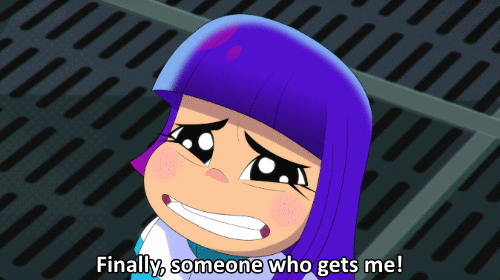
-She likes the scene where Ben smashes the BRADs with a golf club (I have the files to make gifs, that's coming).
-In Camp Cretaceous, the kids weren't allowed to get physical with the dinos. Kenji can't kick a compy, e.g...."Too violent!" NO IMITABLE BEHAVIOR. Hence...you lose a lot (but Kenji gets to punch a raptor now!).
58 notes
·
View notes
Text
Honestly, I think that we as a society are far too willing to say life and society and the world are shit, when what we really mean is that a few specific parts of it are shit. And it seems like such a small distinction, like, obviously we don’t think everything is shit, but when you use “life sucks” as a shorthand for “living as a person while parts of my life are governed by a system designed to grind me down” you start to believe it after a while. And yes, capitalism and racism and colonialism and homophobia and ableism and misogyny and all those other systemic problems do suck ass, but allowing them to commandeer such a vast, wondrous concept as “life” is both giving them too much credit and too much power. Oppressive systems can ruin a lot of things, and cause a lot of stress, but we shouldn’t let them claim more than they already have. Capitalism ruins many things, but don’t also let it ruin the soft peace of an early summer morning when bees buzz through the planter boxes of your apartment balcony. Don’t let abelism claim the innocent joy of talking with a person you love about anything and nothing at all. Don’t let homophobia stake its ownership on singing off-key in your living room with no one to judge you but the cat. These systems have already claimed so, so much, and they’re already so oppressive, but don’t let them convince you that they own life itself. These systems kill, and they kill many, but don’t let them deflect blame by waving it off as “just life being awful.” Don’t let them abdicate responsibility like that. Don’t let them make you believe that life as a whole is awful when life is such a vast thing.
Oppressive systems are a horror, but do not dare let them convince you that life is to blame for your difficulties. Life may not pick its favorites, but neither does it pick its despised. Humans do both, and we have the power to improve on both.
Anyone who tries to convince you that life is anything but brutally fair is trying to sell you something, and usually it’s apathy and disinterest towards improving your circumstances or upsetting the status quo by trying to make synonyms out of that vast, terrifying wonder that is life to something as banal as a bad system and malicious intentions of a very few.
Life does not pick its favorites. People do.
359 notes
·
View notes
Note
helloo just wanted to know your thoughts on the recent tik tok commentary on “booktok” about how literature is being “ruined because of spicy books” and authors who cater to tropes I definitely see both sides!
Caveat: I don't have tiktok. I don't spend a lot of time on bookstagram either. So while I'm vaguely aware of the discourse, assume I spend most of my time blissfully unaware of everything, under my rock, writing my own little things.
Spicy books:
As with everything, there is nuance to be had. I don't think there is anything wrong with spicy books. There is clearly an audience for them and it's great to have books that recognise this desire! Western society can be weirdly puritan about sex and anything that challenges that get points from me. I've enjoyed the spicy scenes myself when they happen to miraculously meet the very specific vibes I personally like.
However, I also don't think every book needs to or should be pressured to be spicy and I personally get annoyed when I feel like spice replaces adequate plot or character development (which is something I've come across a few times in the last few years). I don't say this in a 'every sex scene must only be there to develop plot/character' way! I say this in a, oh my god, why has the plot stopped for sex in every chapter instead way. In a 'you guys used to have interesting conversations! why are you doing this to me!?' way.
But, you know. I'm not typically the target audience for sex scenes. So I'd just not read another book by an author who did that and let other people enjoy it, if that's what they're looking for. I still feel that there are still plenty of other books in the world I can read.
Tropes:
Tropes have and always will be a tool in writing. It's not new that writers are using them, but I think it's just a trend at the moment to be particularly upfront about them (especially in the romance genre tbh). Specifically, I think this is a marketing trend not a writing trend.
(Does trad publishing like books that are easy to market? Obviously. It's a business.)
I don't inherently mind this, because book marketing is really hard and realistically a lot of people don't stop to engage with original content or long descriptions about original content. Especially not on social media. Tropes are an excellent shorthand for conveying information/vibes, and then people can get more information and decide for themselves if they want to engage with the story.
(In a way, to me this is like when people add 'it's queer!' when they make me a recommendation. Does it make me more likely to go and look at the thing? Yes. Is it the deciding factor on if I actually read/watch/like it. Nope. It's just a quick flag for me to consider it and make my own decision.)
Maybe there are people who are specifically just writing tropes without much more to it...but I haven't really seen it in the books I personally read. At least not any more than the usual.
Some great books I've read this year so far:
The Luminous Dead By Caitlin Starling
Our Wives Under the Sea by Julia Armfield
Rolling in the Deep by Mira Grant
(They are all horror to some degree...I've been on a kick.)
100 notes
·
View notes
Note
ok im so new to hockey and ive been getting into leafs and theres just one thing i do not get at all 😭 which is.. is mitchy bad? ive seen people say that he is inconsistent (how long has he been inconsistent?) but ive also seen a LOT of dudebros hockey enthusiasts who say he’s bad and lazy and passes blame and want him to change lines or whatever so i dont really know???
mitch is.... very good actually
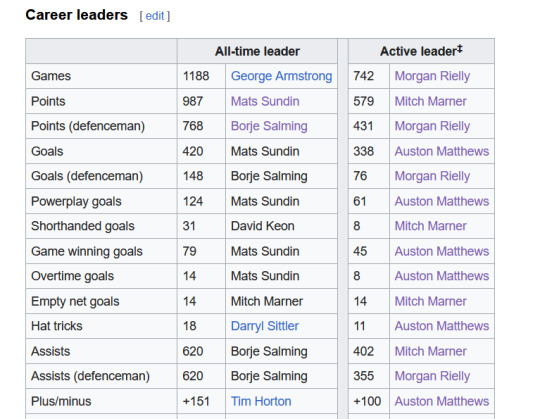
let's start with current leafs records: active leader in points, assists, shorthanded goals. franchise leader in empty net goals.
also worth noting Wikipedia updates these stats after every season versus every game; mitch now has upwards of 600 points, and is the second-fastest leaf to 600, ever (he held the record for fastest for about 2 weeks -- auston beat him just after)
he also has the leafs' longest point streak -- 23 games
this is the general leafs leaderboard:
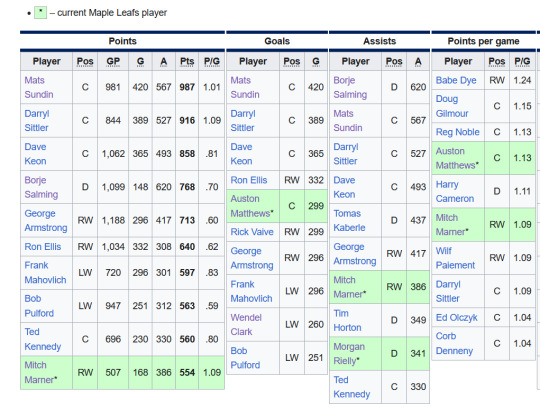
someone appears on that list three times, and it isn't our chosen one am34! (again, this was just up until the end of last season)
Even beyond counting stats, he's still consistently one of the best Leafs around, because he plays defence, is one of the best passers in the league, and penalty-kills. Here's HockeyViz' breakdown of him:


Those two images aren't aligned super well, but we're looking at the sG column on the far right, which is HockeyViz's "overall merit" metric. Here are stars of similar value:
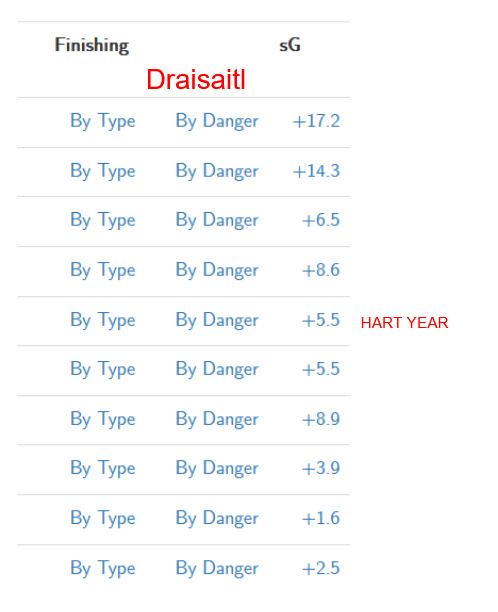
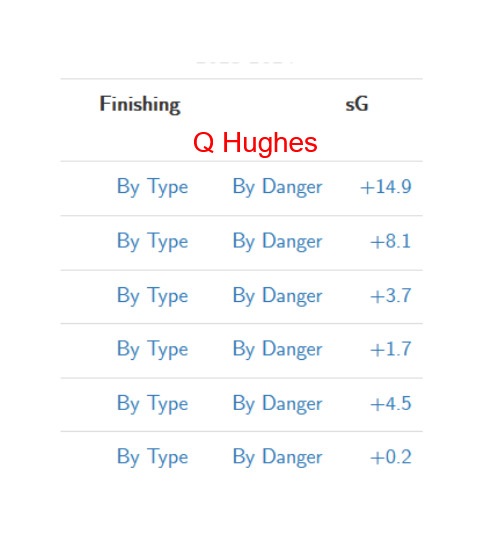
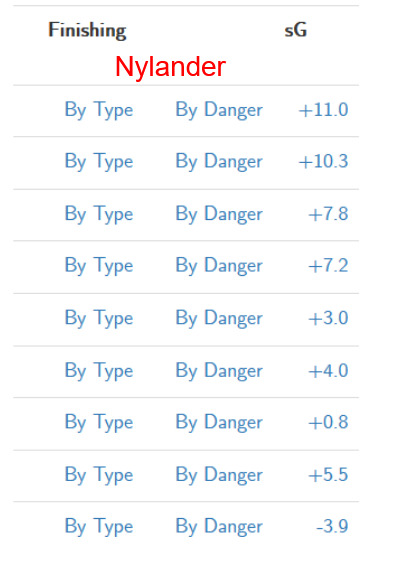
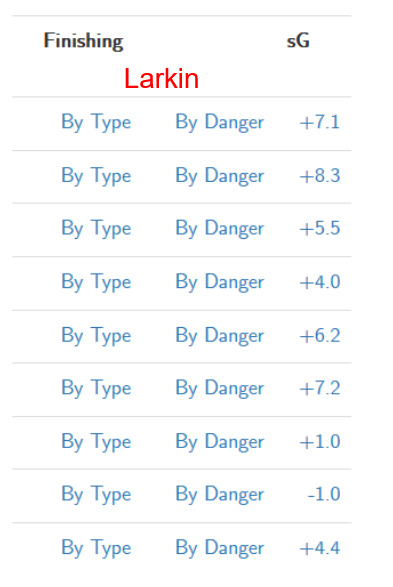

(Obviously, this one guy's metric is not the be-all end-all. But i find it a helpful guideline comparison to similar players -- essentially, Mitch is a one-tick-below superstar, in the tier below your Pastrnaks, M Tkachuks. (who are themselves the tier below Matthews/MacKinnon/Kucherov) "Bad" is a very funny word to use for these players. Bad comparable to McDavid, as if literally everyone else isn't.)
the People Hate Mitch thing is because of this entire personality construct they've developed around him -- he had really tough contract negotiations and signed for "more than he was worth" (aka a reasonable number given expectations of cap rising that did Not take into account a global pandemic coming into effect within a couple years), and the leafs' lack of playoff success (despite the fact that he is the Leafs' active playoff points leader). He's also not super well media trained and never seems to say the right words the right way, even if the obvious sentiment is there, and people who already want to hate on him just take it as further fodder for their complex.
Add that to the "concerns" about his relatively small frame that have been around forever and the ongoing Wendel Clark complex Toronto fans seem to have (ability and/or willingness to drop the gloves = grit = value) and you have a recipe for people that Hate Him For No Reason.
He is absolutely having an off year this year, and I don't know if he's got some nagging injury or whatever, but even in his off year he's one of the best Leafs.
I also think this is partly because of the underrating of Auston Matthews in comparison -- he's a generational goalscoring talent! He's a top three player in the league and he isn't number three! -- that Mitch is deemed "bad," because he's not quite as good as AM34 and we have determined that that means he's somehow Terrible. Sigh.
#asks#mitch marner#they hate to see a man full of joy and whimsy winning...#also INCONSISENT LMAO he is one of the Most consistent leafs actually KSJDFHKSJDFHSKJDFHKSDJFH#(im not poking fun at you im poking fun at that idea i promise)#anyway people are WEIRDLY invested in hating him and because of this they'll make shit up like 'Marner is bad'#or 'Mitch Marner has a shoot-first mentality'
93 notes
·
View notes
Note
I very much see your points! I suppose the only real difference between your viewpoint and mine stands in the fact that while yes, I do agree that to use the terms TME/TMA to sort of "gatekeep" specific experiences is bad, I feel like that's more of an issue with individual (although decently widespread, unfortunately) misappropriation of the language, rather than a conceptual flaw with the framework. I believe there's a lot of people who intend to use the terms correctly, and if and when they happen not to we should aim to correct that individual behavior rather than throw the baby out with the water, so to speak. I do understand that it's a bit of a tall ask when everyone's at each other's throats and often not willing to return the favor, but at the very least that's what we should strive for if we want to reach mutual understanding (I say all this knowing that's your goal too, I wouldn't assume otherwise).
After all, I do believe that the way "transandrodorks" are treated stems from a similar misunderstanding or overgeneralization of what we actually stand for, and an unwillingness to reach out a hand and actually listen to what we have to say rather than assume the worst from a few bad actors. That's why when the positions are reversed I want to at least try to reach out and meet the other party in the middle, even if the same courtesy isn't always afforded to me.
As for your example with Caster Semenya, I do believe that intersex people should absolutely be allowed to use the term TMA to refer to themselves regardless of AGAB if they feel it's appropriate, as their experiences often exist outside the strict framework we tend to employ and they would know best which terminology applies to them and which doesn't (and should also obviously allowed to make up their own when needed). I don't see eye to eye with anyone who advocates for TMA/TME while disagreeing on this point (and I'll admit I'm not sure what the general consensus here is).
And as for the other example, I'm a bit hesitant to continue that specific analogy (which I do believe to be absolutely valid, btw) since I'm white and I would rather not say anything out of turn, so I'll instead offer the usual rebuttal to the analogous point: when someone who is TME experiences transmisogyny, it's an atomic experience, not continuous. They might be mistaken for a trans woman, but as they are not actually a trans woman they don't live in the same state of constant fear and threat of (this specific type of) violence. They can prove they're not transfem, and the attack will stop, or at least lessen. They have the option of simply not being transfem, something which obviously isn't afforded to transfems. That doesn't mean that the experience they went through didn't affect them, or did so less, but they would live it differently from someone who would be the actual intended target.
Now, I relayed that point but I personally am not sure I agree with it 100%, specifically the latter half. If the TME person being attacked happens to be another trans person, rather than cis, they don't get to escape the danger through proving they're not transfem, because then they're just trading a type of violence for another (the one actually meant to target them, which might look differently). Not to mention that you won't always be in a situation where you can/want to prove it, or where the other party will believe you or care either way. I guess the bigger point here is that if you're TME you're not always experiencing transmisogyny in every facet of your life, though.
Either way I believe there's plenty of more nuance that could be had here, and in that sense I do dislike how that's lost when using TME/TMA, but as terms they were never intended to encompass every possible experience in shorthand but rather just give a general idea, which could then be complemented by any additional info you would be willing to share.
Ah but you see, that's the talking over someone else's experience I'm talking about.
When TME people experience transmisogyny, it is incidental and not continuous. Well. For some, like my example of the idiot mistaking me for Mexican for being brown while saying a French word, that is true. I am not commonly mistaken for Mexican, though it's not unheard of, and it hasn't happened in years. Specifically, when I stopped wearing my hair long and started binding, I stopped being read as *Dominican* (which racist people do not see the difference between the various Latin American countries) and thus stopped experiencing this problem. It's incidental, but I still think that the best choice is to ally with Mexicans and other Latinos and Hispanics to stop the bigoted behavior from happening altogether.
But what happens when it IS continuous? Black cis women, also labeled TME, are disproportionately transvestigated and heavily punished by transmisogynist laws and rulings despite not being transgender themselves. Not only does showing birth certificates not help (and, also, I think this is Bad Logic, because if I have to show my personal private documents in order to be left alone, I'm still being Affected By The Oppression because I have to carry my documents everywhere. Like that's just Baby's First Fascism) but I have personally witnessed multiple black celebrity and politician cis women be forced to prove they are women *while they are pregnant*. And yes, that is misogynoir. But it is practiced by utilizing the exact same societal systems to hurt trans women. Thus my logic on the other post- all oppression hooks into each other and back onto itself somehow. Not only is that not incidental and very much continuous, but this a systemic problem and why cis and trans women and *especially* any person of color regardless of gender should ally among themselves to fight it.
And, finally "they can prove they're not trans fem and the attack will stop or lessen"- sure, much like how Hannah Gadsby was able to say "no no I'm not a faggot you see I am a lady a woman no man-liker here" and the guy left her alone wait no he didn't he beat the shit out of her anyway. Like that's the problem I have with this- the reality is that this does not apply to every single person and that real living people are being hurt and sometimes killed while being labeled exempt from the very thing that kills them. We have had cis people die due to bathroom laws meant to hurt trans women. It is absolutely not a matter of just proving you're not one because transmisogyny is one help of a drug and it is used as a dangerous weapon to any and everyone it's pointed towards.
And that is the crux of my problem. People can use whatever words they like to describe their own experiences. Pointing these words to describe someone else's experiences for them, however, and denying that their very real lived experiences have happened or that it matters less is where I draw the line.
91 notes
·
View notes
Note
do it. gimme the Izzy straight-coded meta 👀
I feel like I need to preface this by saying that Actually, Izzy Is Straightcoded would be the inflammatory clickbait title I'd give this if it were written to draw traffic & ad revenue to my shitty website. So don't take that term too seriously.
There has been a lot of ink spilled about Izzy thinking he's in a story where one can only be subtextually queer. Some even by yours truly, but the more I think about it, the less sense it makes. What would be the purpose of queercoding Izzy?
In general, villains* aren't queercoded to show that men being attracted to other men is bad. It's often the outcome; but it's not why the trope exists. It exists because cishet people tend to be (and are encouraged to be) profoundly uncomfortable with gender nonconformity, and so, making a character gnc becomes a quick and easy way to make him appear twisted and untrustworthy. If he** can't even obey the fundamental rules of his own gender (rules that are inherent and unchangeable!) what other rules does he disobey?
Or: If a man is insufficiently masculine, he can't be trusted to have morals. The villain isn't gnc because that's an evil trait to have; rather, the gender nonconformity is a symptom of his evilness. Being evil is what enables him to embrace his feminine side, and embracing his feminine side is what others him and marks him as a villain.
This only really works when he's contrasted with a hero (or heroine) who is Doing Gender Correctly. The villain is foul to highlight how good the hero is. The Hero will be honest and straightforward, brave, physically powerful; the Queercoded Villain treacherous, cowardly, and physically weak. The hero is a Proper Man, a Good Person. The villain an Improper Man, and therefore, a Bad Person.
Of course ofmd fundamentally rejects this. The shorthand wouldn't work, because ofmd simply doesn't think effeminacy is creepy. It's uninterested in moralizing self-expression; it just lets people be how they are. There's a wide range of expressions of masculinity on this show, and none of it is inherently bad. People are allowed to be hypermasculine, flamboyant, and anything inbetween, can express their gender in whatever manner they want, and it's all fine - as long as they are authentic about it. Be however you are, but be yourself, and this is what Izzy fails at. The repression marks him as a villain. The strict adherence to what he thinks a Real Man Pirate ought to be like. He's very preoccupied with enforcing a traditional (and toxic) masculinity on himself and others. It's no coincidence the characters he antagonizes the most - Stede and Lucius - are also the most effeminate ones. And I know, I know anglophones have a much more casual relationship to twat and cunt, those don't nearly feel as uncomfortable for y'all as they do for me, so I don't want to assign too much significance here, but he is the only character who constantly uses this kind of language, and also the one who uses the most gender&sexuality based slurs (as far as I remember).
All of this while being clearly, obviously queer himself! I do not feel like I need to explain this; his flustered reaction when Lucius asks him if he's ever been sketched speaks for itself. The fact that he meets Stede and immediately slices his shirt off of him, speaks for itself. And so on.
Izzy isn't straightcoded in the sense that the story wants us to believe he's exclusively attracted to women. Much like a queercoded villain doesn't need to be shown to be attracted to men (and can even be shown to be attracted exclusively to women!) to still be queercoded. He's straightcoded in the sense that he's a stand-in for restrictive and toxic gender roles that society enforces on people. He buys into the idea that there's a way of Doing Gender Wrong, and this is presented as a tragic character flaw. Something he has to overcome to be able to do the thing that actually marks a hero in this show: express himself authentically.
Part of why I found his death so moving is because it enables him to set right the toxicity he spread. His rehabilitation arc was about himself; about finally allowing himself to be, accepting love, accepting community. His death was about taking responsibility. About fully recognizing the hurt he caused. Looking death in the face enables him to finally abandon the last shreds of that toxicity, to apologize and be granted forgiveness. In the end, he was not beyond saving, and the harm he has done will be healed.
*Izzy is introduced as an antagonist to both Stede and the central romance of this romcom. I'm not gonna debate this; if you disagree, fine, but you clearly have such a fundamentally wrong different view of the show that it's pointless for us to try and convince each other.
**of course Queercoded Female Villains exist s well, but they are a whole different can of worms and less relevant to this discussion
#okay now that i typed this all out i realize that i just basically keep writing the same izzy post over and over sorry for that#but i spent too long on it not to post it#i do not remember who said it but i saw a post a few days ago along the lines of#izzys death reads like the fantasy of a repentant abusive parent#and i think theres truth to that#may also read like the fantasy of the kid of an abused parent#finally the person who hurt you is able to apologize and you can part on good terms#but also wont have to deal w the fallout#i write as my grandmother who doesnt speak to us is probably dying idk#anyway!#i hope this is somewhat interesting#our flag means death#ofmd s2 spoilers#izzy hands#thoughts#anonymaus#message
155 notes
·
View notes